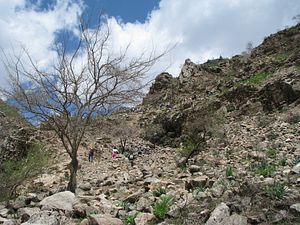Leaders from the Collective Security Treaty Organization have gathered in the Tajik capital, Dushanbe, for a scheduled summit. The presidents of Armenia, Belarus, Kazakhstan, Kyrgyzstan, and Russia are holding separate bilateral meetings with President Emomali Rahmon of Tajikistan before the Tuesday summit.
The meetings come 10 days after a pair of gun battles in the early hours of September 4 in Dushanbe and neighboring Vahdat led to a manhunt in the mountainous Romit Gorge. Although some local media reported on September 11 that Abduhalim Nazarzoda — a deputy defense minister until the events of September 4 — had been killed, subsequent reports from the government say he is still alive.
As Parviz Mullojonov described in a recent panel convened by RFE/RL, there are a number of competing theories about what happened on September 4, but three narratives have emerged.
First, in general the government story features an attempted coup d’etat, and links Nazarzoda with the recently-banned Islamic Renaissance Party of Tajikistan (IRPT). But, Mullojonov points, out each iteration of the state version — coming from different government agencies — features different numbers of victims, arrested fighters, remaining supporters, and so on.
In another version of the events, purportedly communicated by Nazarzoda’s supporters through social media, the government provoked the fighting. According to this version, the Tajik government was planning to accuse Nazarzoda and other former United Tajik Opposition commanders of attacking several police stations.
The final version described by Mullojonov stems from suggestions that Nazarzoda had gotten wind of government plans to prosecute him. Rather than wait, Nazarzoda fled. Edward Lemon pointed out that the authorities claimed to have captured a large weapons cache at Nazarzoda’s home that he apparently fled without. If Nazarzoda had indeed plotted to attempt a coup, it was a poorly conceived and executed plot.
President Nursultan Nazarbayev of Kazakhstan seems to have his own theory. After meeting with Rahmon, Nazarbayev reportedly expressed his support for the Tajik government and aired a fourth theory — that the trouble in Dushanbe had been provoked by external actors. As reported by AKIpress, Nazarbayev said, “Tajikistan is on the peak of the fight against terrorism. It borders with Afghanistan. Tajikistan is always disturbed on the border with Afghanistan and the latest events occurred with involvement of external forces.”
Worth looking for after the summit will be comments from Russian President Vladimir Putin regarding the incidents. A Kremlin aide quoted by Reuters, Yuri Ushakov, said that Russia is prepared to “provide assistance one way or another, as well as political support.” Ushakov also said, “I think this matter will be one of the key ones during talks.”
Although Nazarbayev’s comments came after the RFE/RL panel recorded, they were entirely predictable. Often trouble in Central Asia is cast by regional regimes as the product of external forces. But rather than an external provocation, whatever prompted the violence in early September and motivated Nazarzoda’s flight, it most certainly is more of an internal matter. As Lemon commented:
It’s common for outside observers and the government itself to always say that dangers proceed from the outside, so the main destabilizing factors in Tajikistan will in fact be external, they will come from spillovers from Afghanistan, they will come from the Islamic State. But no, what do we see? Political violence in Tajikistan [is] all about local politics, these are all about the kind of political economy of the post-conflict state.
Listen to the full panel here.

































